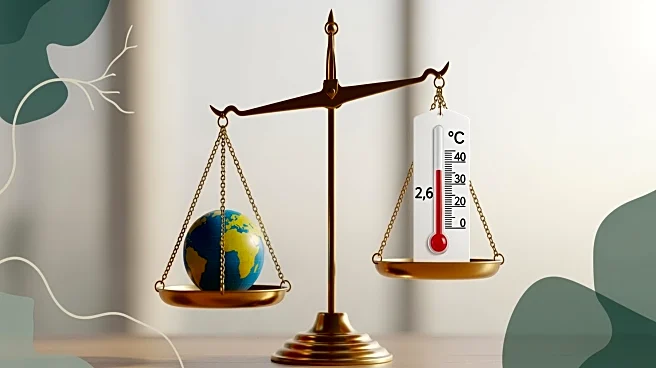What's Happening?
Recent research by Climate Central and World Weather Attribution indicates that the Paris climate accords have been somewhat successful in curbing global heating. The study reveals that without these accords,
the planet would be on track for a 4°C rise in average global temperature. However, due to the protocols, the increase is projected to be 2.6°C. The Paris Agreement, established in 2015, allowed countries to set their own emission reduction targets, known as Nationally Determined Contributions. Despite some progress, a significant gap remains between current pledges and the necessary cuts to limit temperature rise to 1.5°C. The research highlights that the world now experiences an average of 11 more hot days per year due to the additional 0.3°C of warming since 2015.
Why It's Important?
The findings underscore the urgent need for more ambitious climate action to prevent severe global warming impacts. A 2.6°C increase would still result in a dangerously hot planet, with more frequent and intense heatwaves. This poses significant risks to public health, labor, and infrastructure, particularly in vulnerable regions. The study emphasizes that the costs of inaction are rising faster than adaptation efforts, with insufficient financing for local heat adaptation. The report also highlights the disproportionate impact on small, ocean-dependent countries, which contribute minimally to global emissions but face significant increases in super-hot days. This situation exacerbates global inequalities and could lead to geopolitical instability.
What's Next?
The upcoming COP 30 in Brazil will be a critical moment for countries to enhance their climate commitments. The report calls for deep, rapid, and sustained emissions reductions to meet the Paris Agreement's goals. As the world prepares for this conference, there is a pressing need for countries to update their Nationally Determined Contributions with higher ambitions. The research suggests that without more robust climate efforts, future heatwaves could become significantly more severe, highlighting the importance of international cooperation and increased adaptation financing.
Beyond the Headlines
The study also points to the ethical dimensions of climate change, as those least responsible for emissions are often the most affected. This highlights the need for climate justice and equitable solutions that address the needs of vulnerable populations. The report suggests that the current trajectory could widen the gap between developed and developing nations, potentially leading to further geopolitical tensions. Additionally, the findings stress the importance of integrating climate considerations into public policy and planning to mitigate the long-term impacts of global warming.









